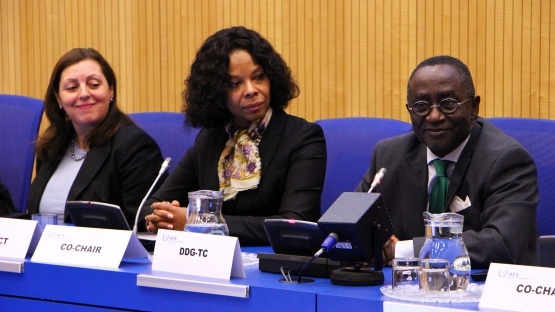The fifth meeting of the Advisory Group on Increasing Access to Radiotherapy Technology in Low- and Middle-income (LMI) Countries (AGaRT) has just taken place at the IAEA's Vienna headquarters from 28 to 30 October. Over 50 participants attended, seeking to address the availability of effective, affordable and safe radiotherapy equipment with guaranteed long-term functionality.
The incidence and mortality associated with cancer is rapidly increasing around the globe, in particular in LMI countries. By 2020, according to recent estimates from the International Agency for Research on Cancer (IARC), we can expect over 17 million new cancer cases and a death toll as high as 10 million per year.
Alongside surgery and chemotherapy, radiotherapy is an indispensable part of cancer care - more than half of all cancer patients will require radiotherapy during the course of their treatment for either curative or palliative care. However, over 30 countries in the world are currently without even one single radiotherapy service. Most of these countries are located in Sub-Saharan Africa. It is estimated that LMI countries face a deficiency of around 5,000 radiotherapy machines. The practical implications of this shortage mean that up to 70% of cancer patients in LMI countries do not receive the care that they so urgently need.
To address the gap between medical needs and technical capacities, the IAEA's Programme of Action for Cancer Therapy (PACT) established AGaRT in 2009, with the technical support of the Division of Human Health (NAHU) and the Division of Radiation, Transport and Waste Safety (NSRW). AGaRT provides a forum for experts from the regions (end-users of radiotherapy machines) and radiotherapy equipment manufacturers to explore innovative ways to reduce costs and simplify procedures to deliver radiotherapy solutions that are affordable, sustainable and suitable for low resource settings.
The fifth AGaRT meeting brought together regional experts from Africa, Asia and the Pacific, Europe and Latin America, radiotherapy equipment manufacturers (Eckert & Ziegler, Elekta GmbH, HITEC, IBA, Panacea, Philips Healthcare, UJP Praha, VAMED, VARIAN and XStrahl), and representatives of international organizations, such as the World Health Organization (WHO), the Union of International Cancer Control (UICC), International Medical Physicists Organization (IOMP) among others.
"Our aim is to provide our Member States with the tools and expertise they need to improve their cancer care capacity," explained Deputy Director General and Head of the Department of Technical Cooperation, Mr Kwaku Aning, in his opening statement.
Despite largely different priorities and requirements, the two groups represented at the meeting - users and providers of radiotherapy equipment - found no shortage of common ground. Over the past five years, participants at the AGaRT meetings have worked together to identify limitations in delivery, operation and maintenance of equipment in LMI countries and to develop a basic radiotherapy equipment package tailored to these settings.
Unfortunately, medical devices do not always operate properly throughout their expected lifespan. Machines may break down and, without the convenience of nearby repair facilities or accessible funding, may remain inoperative for long periods of time - time that cancer patients in need of treatment do not have. As part of AGaRT's mission to help improve cancer care in developing Member States, AGaRT have worked to elaborate procedures to guarantee the sustainability of radiotherapy machines. The AGaRT-developed Guidelines to Ensure Long-Term Functionality provide advice to countries that are embarking on the process of establishing or expanding their radiotherapy services. The Guidelines establish best practices for facility maintenance, life cycle costing, comprehensive acquisition processes and ongoing professional training. With the Guidelines, users of radiotherapy equipment in LMI countries can improve the sustainability of radiotherapy investments.
Cancer is no longer a disease which exclusively affects the developed world-the harm and pain it causes can be felt throughout Africa, Latin America and the Asia and the Pacific regions. With the needs of LMI countries in mind, AGaRT meetings will continue to bring all the relevant stakeholders together to find solutions, forge agreements and finance the healthcare which is inadequate in so many regions of the globe.






